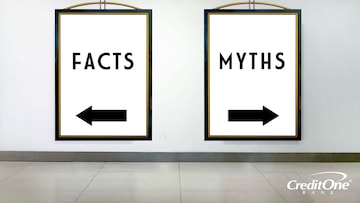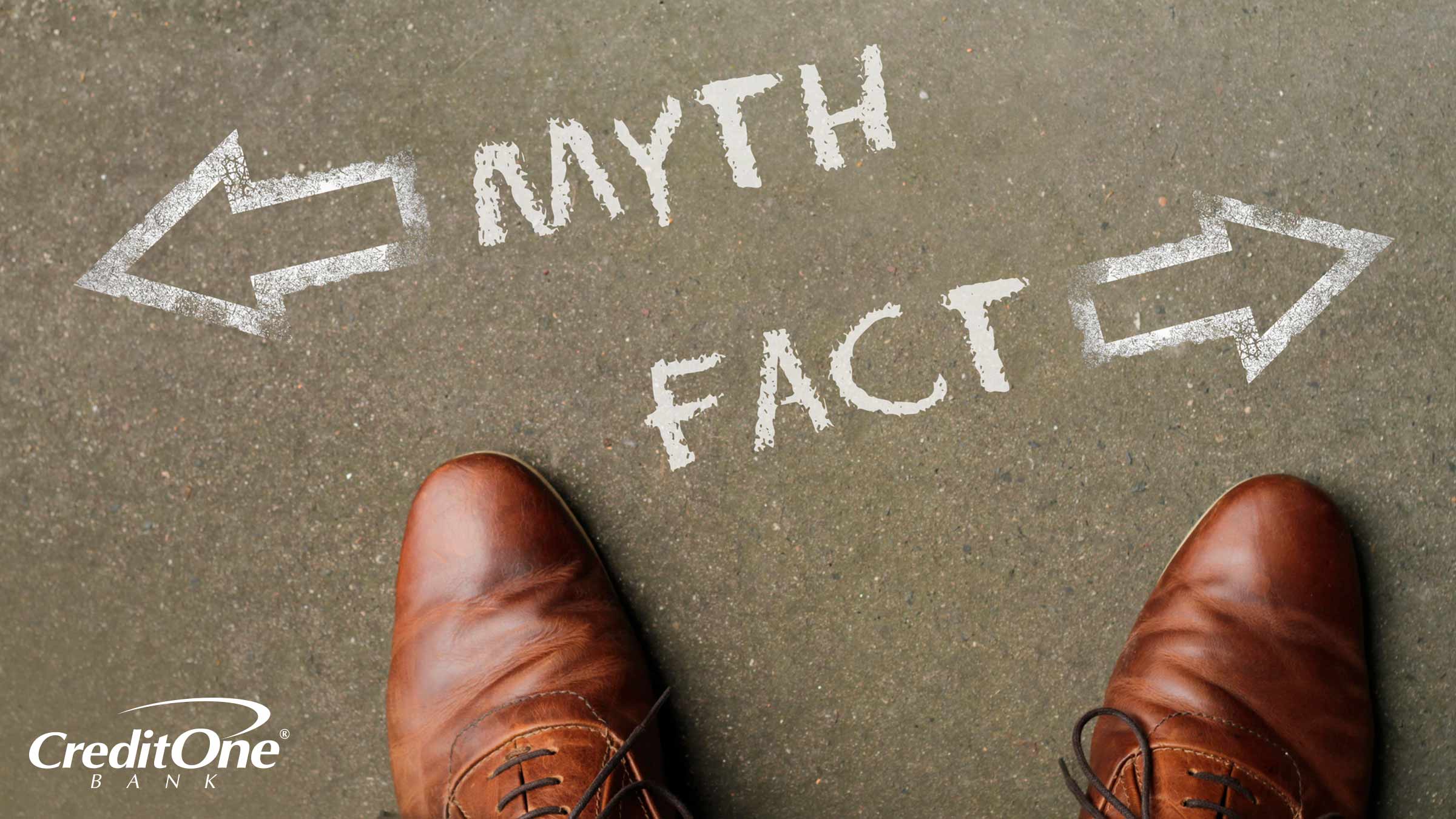
Common Credit Score Myths
April 17, 2024
Figuring out what does and doesn’t improve your credit score can get confusing. But learning the truth behind 13 common credit score myths can help.

In this article:
- Introduction
- Myth #1: Checking My Credit Report Can Lower My Score
- Myth #2: Applying For a New Credit Card Will Permanently Hurt My Score
- Myth #3: I Should Keep a Balance on My Card To Improve My Credit Score
- Myth #4: I Can Boost My Score by Closing My Credit Card Accounts
- Myth #5: Factors Like Age, Race, Sex, and National Origin Have a Big Impact on My Score
- Myth #6: Once I Have a Poor Credit Score, It’s Ruined for Good
- Myth #7: My Income Impacts My Credit Score
- Myth #8: A Good Credit Score Means You’re Rich
- Myth #9: A Perfect Credit Score Doesn’t Really Matter
- Myth #10: Paying Off Debt Increases Your Credit Score
- Myth #11: My Employer Can See My Credit Score
- Myth #12: Student Loans Don’t Affect My Credit Score
- Myth #13: Using Debit Cards Helps Build a Good Credit Score
- Bottom Line
Introduction
In the land of credit scores, myths and fallacies abound. And deciphering the truth about how to improve your credit score can be tricky in a sea of misinformation. So, learning the truth surrounding 13 common misconceptions about credit scores can help you take control of yours.
Myth #1: Checking My Credit Report Can Lower My Score
When you check your credit report at any of the three major credit reporting agencies, your credit history will reflect a soft inquiry. Soft inquiries don't hurt your score since a lender isn't reviewing your report to potentially extend new credit. Keeping a close eye on your credit score actually means you’re more likely to catch reporting errors and be aware of areas for improvement. By law, everyone is entitled to one free credit report every twelve months from each of the three major credit reporting companies. But you now also have the option to check your credit report for free once a week online at AnnualCreditReport.com.
Myth #2: Applying For a New Credit Card Will Permanently Hurt My Score
Opening a credit card is a fantastic way for consumers with little credit history to help build their credit. Applying for a new card results in a hard inquiry on your credit report, and that can negatively impact your credit in the short run. However, repayment history is one of the most important factors that affect your credit score, so demonstrating responsible payment habits is one of the fastest ways to increase it. Just be careful not to open too many cards too quickly; it may signal to creditors that you can’t manage your financial obligations and could ding your score.
Myth #3: I Should Keep a Balance on My Card To Improve My Credit Score
While using your credit card regularly can boost your credit score, you don’t need to max it out to reap the benefits. In fact, you should aim to use no more than 30% of your available credit, since credit agencies look closely at utilization ratios to generate your score, which is the amount of debt you carry compared to the amount of credit you have available. In short, the more credit you have access to and the less of it you use, the higher your credit score could be.
Myth #4: I Can Boost My Score by Closing My Credit Card Accounts
This myth is wrong for two reasons. One, using your credit card and making the payments in full and on time demonstrates you can handle your financial commitments, which is a dependable way to help increase your credit score. Two, canceling a credit card means you lose the available credit from that account. If the sum of your revolving credit limits goes down, your overall credit utilization ratio could go up. And if it goes above 30%, this can shave some points off your credit score.
Myth #5: Factors Like Age, Race, Sex, and National Origin Have a Big Impact on My Score
While industries like auto insurance consider characteristics like age and sex to determine rates, this is not the case when it comes to your credit score. The Equal Credit Opportunity Act makes it illegal to use this type of information when calculating your credit score, which helps prevent discrimination against minorities.
Myth #6: Once I Have a Poor Credit Score, It’s Ruined for Good
There is virtually no financial situation — bankruptcy included — in which your credit will be ruined permanently. Your credit score is a snapshot of how positive your financial history is over a rolling 7-10 years, depending on the scoring model, and it can be rebuilt even if it suffers a serious blow. The older any blips on your credit report are, the less important they become to credit bureaus. This is not to say a damaged score won’t take a while to repair, but it’s possible with financial discipline and patience. It’s a marathon, not a sprint.
Myth #7: My Income Impacts My Credit Score
Having a nice income and asset portfolio may help you to get a loan or a higher line of credit, but it has zero effect on your actual credit score. That’s because credit scores are calculated using specific credit data, and your income and what you own are not included in that data.
Your income may, however, indirectly affect your credit score in that a higher income could make it easier to keep your outstanding balances lower and to make consistent, on-time payments, both of which are factored into calculating your credit score.
Myth #8: A Good Credit Score Means You’re Rich
Having a good credit score means lenders view you as creditworthy. And it’s typically an indicator of overall financial health. However, having a good credit score does not mean you’re rich.
Myth #9: A Perfect Credit Score Doesn’t Really Matter
The higher your score is in the grand scheme of things, the better rates and terms you can get compared to those with a lower score. So having a perfect credit score of 850 does make your life a lot easier. But it’s important to know that there are no bonus benefits that come with being a member of the “850 Club.” Sure, a high credit score is always a great goal … and there’s no higher than perfect. But the fact of the matter is once your score reaches a certain point — say, 760 — lenders likely already see you as every bit as reliable as someone with an 850.
Myth #10: Paying off Debt Increases Your Credit Score
Yes and no. If you pay off revolving credit, like your credit card debt, your credit score will benefit. But paying off installment debt, such as a car loan? Not necessarily. In fact — depending on your credit profile — doing so can actually lower your score a little bit. For example, if you paid off the only installment loan in your credit mix, your score could go down because having a mix of revolving and installment is generally good for your score.
Now, this isn’t to say you shouldn’t pay off your debt. Just because it may slightly ding your credit score, you don’t want to keep that loan open — accruing interest — for the sake of maintaining a high credit score.
Myth #11: My Employer Can See My Credit Score
This myth lives on because many people use “credit score” and “credit report” interchangeably. An employer may check your credit report — with your permission — but not your credit score. And the credit report they can pull is not the same report lenders see. It’s abbreviated and doesn’t contain certain personal information, such as your date of birth.
A potential employer’s inquiry has no effect on your credit score, and only you, not other potential employers or lenders, can see that it ever happened.
Myth #12: Student Loans Don’t Affect My Credit Score
A student loan may affect your credit score for a variety of reasons. Your credit report will contain information from your student loan, including the amount you owe on the loan and your payment history. So — just like other types of debt — if you make your student loan payments on time, every time, your credit score will benefit. And, because student loans are considered installment debt, they can help you diversify your credit mix.
Myth #13: Using Debit Cards Helps Build a Good Credit Score
Your debit card and your credit card are two separate things. Using a debit card means you’re pulling straight from your bank account — not borrowing — so there’s no balance to pay off afterward. And, since you’re using your own money, your purchases are not being reported to any of the credit bureaus. Meaning they don’t help build positive credit history and improve your credit score.
Bottom Line
Figuring out what does and doesn’t impact your credit score can get confusing. Even more so when trying to untangle the truth behind the many credit myths that may be passed along as financial advice. It’s important to know what is and isn’t factored into your credit score because you can use that information to live a healthy financial life.
If you’re looking to get a new credit card to build your credit, you can see if you pre-qualify for a Credit One Bank card today, with no impact on your credit score.



